The Romance of Isabel Lady Burton – by Joanna Snellin
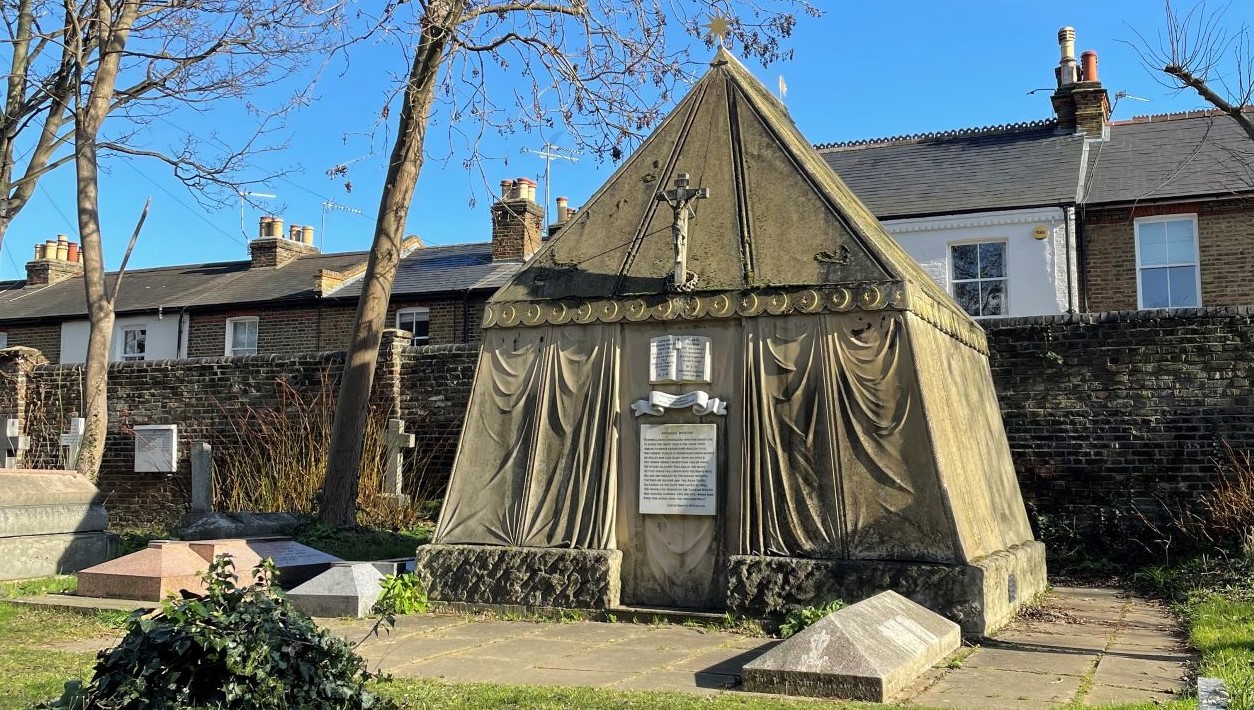
Habitats & Heritage volunteer Joanna Snellin shares her discoveries about the illustrious life of Lady Isabel Burton for International Women’s Day.
Lady Isabel Burton was the wife of Sir Richard Francis Burton, the famous Victorian explorer, soldier and writer. Many books, academic papers and essays have been written about the life of Sir Richard, a number by Lady Isabel herself, and yet she is rarely mentioned. When she does come up it tends to be simply as his wife and biographer. W.H. Wilkins, the co-writer of her autobiography ‘The Romance of Isabel Lady Burton’ wrote that when writing about her husband she “studiously avoided putting herself forward”. It is clear that whilst her life was completely entwined in his, her story is a deeply fascinating one that she chose to keep private in favour of pushing her husband’s story to the fore. Indeed, it was not until her husband died that she started to write her autobiography and share just how remarkable a woman she was.
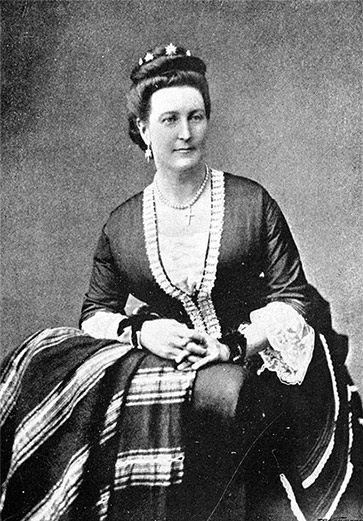
Isabel Arundell of Wardour was born at 8.50am on Sunday March 20th 1831 into one of the oldest families in England with a long history of adventure and proximity to greatness. Her Catholic parents were strict and over protective but on the whole she had a happy, peaceful childhood in a loving family home. As a child Isabel was most often found outside and was never happier than when adventuring in the woods, on the beach or in the Essex countryside in solitude with her imagination or a good book. Her favourite books were Disraeli’s Tancred and other occult books, “but Tancred, with its glamour of the east, was the chief among them, and I used to think out after a fashion my future life, and try to solve great problems. I was forming my character”.
Like many Victorians, Isabel was deeply fascinated by the supernatural, particularly Tarot and Fortune Telling. In her autobiography she provided the exact date and time of her birth, “for those who like horoscopes” and described in great detail the serendipitous meeting with a Romany Gypsy named Hagar Burton. Isabel would sneak out to meet Hagar against her parents wishes in order to spend time listening to her stories about the history of the gypsies and in turn would bring medicine, food and anything else they required. During their last meeting Hagar Burton gave Isabel a horoscope reading that would set her on course towards the most important adventure of her lifetime.
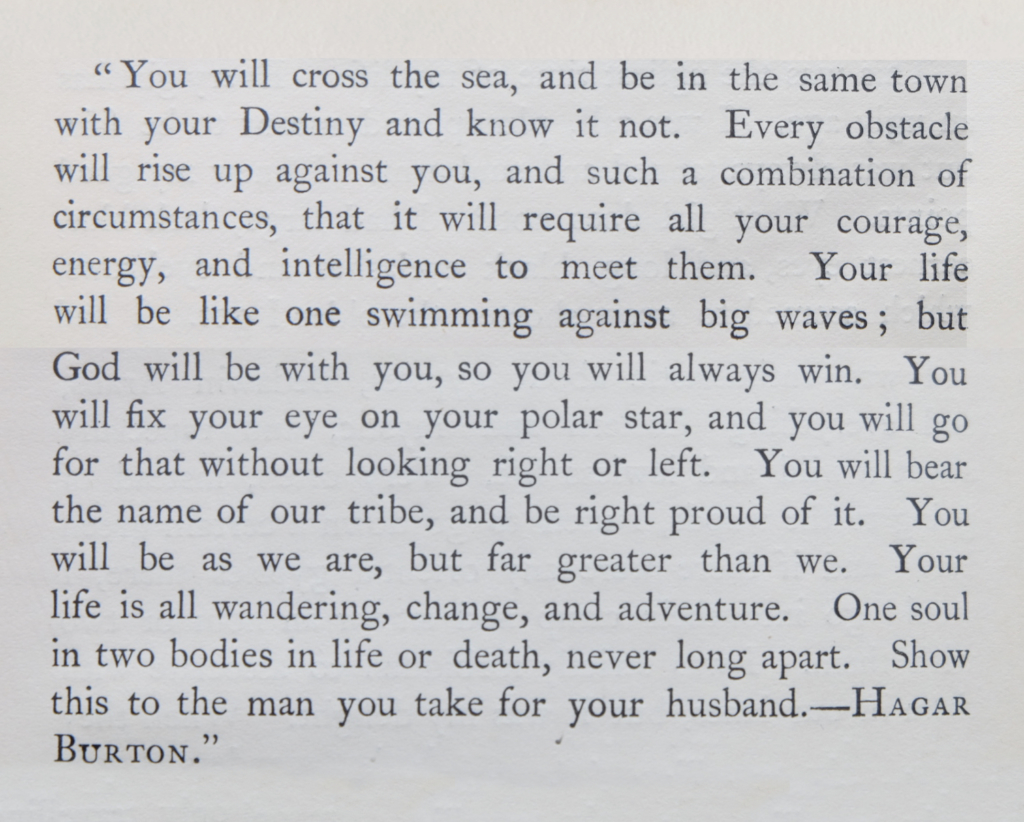
Isabel had grand ambitions and dreams for her future and noted, “I always felt that if I were a man I should like to be a great general or statesman, to have travelled everywhere, to have seen and learnt everything, done everything: in fine, to be the Man of the Day!” She knew the power she had and absolutely believed in her intelligence, passion and competence. What held her back was Victorian Society and its low expectations for women. She wrote of how horrifying the thought of marrying a ‘proper man’ was to her. She feared ending up a bored and dissatisfied housewife living in the countryside “with a bunch of keys, scolding my maids, counting eggs and butter, with a good and portly husband… with a broad-brimmed hat and a large stomach.” She would have known deep down that the only option for her outside of such a marriage was spinsterhood or joining the Church but instead of giving in to such a fate she used her imagination, combined with her faith in the gypsy Hagar’s prophecy, and waited for her ideal, heaven sent man to come and find her. In modern parlance, she successfully manifested the man of her dreams.
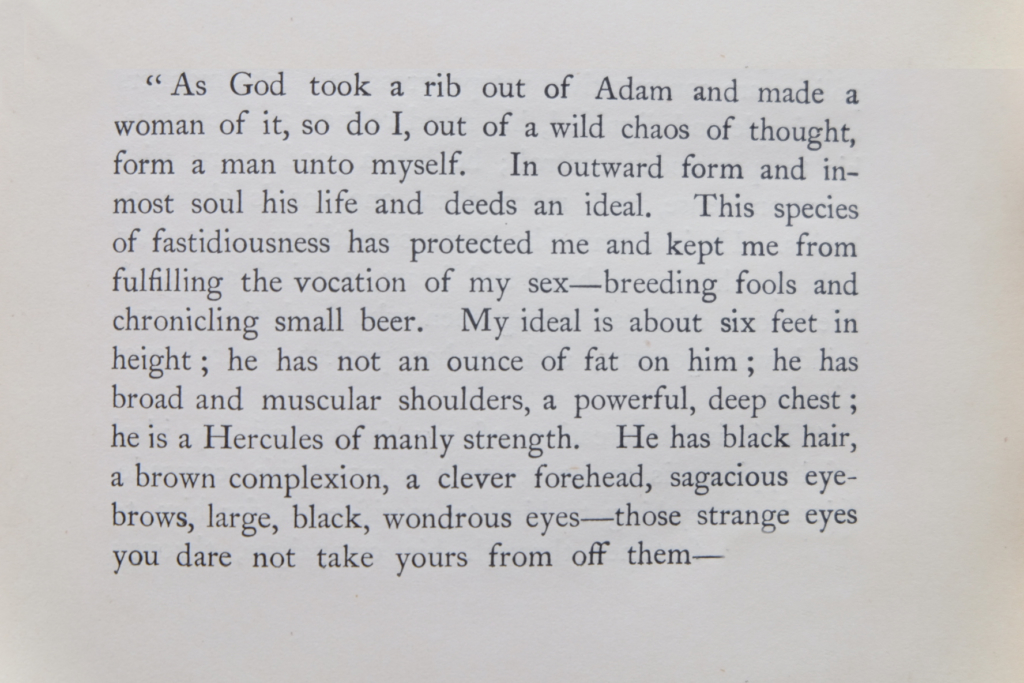
In 1850, at the age of 19, Isabel left England for the first time. With the London society season over, the Arundell family, like many other families in their society circle, took off for Boulogne for a change of scenery, fresh air and the French culture. Little did she know that a certain 29 year old Richard Burton was also in Boulogne; he had been furloughed from the British Army’s Indian service after 7 years due to mental and physical fatigue and had gone to join his family. Even though they were finally in the same town, due to the Arundell ladies being of higher social standing and very well protected by their parents, it would be some time before Richard and Isabel became acquainted. When they finally crossed paths, on one of Isabel and her sister’s walks on the Ramparts, Isabel was ‘completely magnetised’ by his dark, brooding energy and ‘straight, Arab features’. She found herself hypnotised by his ‘black, flashing eyes with long lashes that pierced one through and through’, his ‘fierce, proud, melancholy expression’ and a smile that ‘looked as though it hurt him’. When they walked away from Richard, Isabel turned to her sister and whispered “That man will marry me.”

After leaving France, Isabel didn’t see Richard again for 4 years, though she kept track of him by reading about his adventures in the newspaper. She returned to London and re-joined society, back to the same balls, operas and ballets that she had frequented before leaving for Boulogne. However, deep down she was a changed woman, for she had met the man she was convinced she was destined to marry. He was a living, breathing person and no longer just a figment of her imagination; she had met her destiny and was hopelessly, head over heels in love. Unfortunately for Isabel, whilst this love grew and intensified, the object of her affection had set off on his famous pilgrimage to Mecca and would not return to England for a few years. When reading the entries of her diary written during this period you would be forgiven for thinking that she was in fact already his wife. By using the newspapers and society gossip she was able to follow his adventures from Mecca to Bombay, through Ethiopia and back to England just as the Crimean War broke out. She wrote that she prayed for him daily and as her biographer W.H. Wilkins wrote, “who shall say that it was not Isabel’s prayer, quite as much as Richard Burton’s skill and daring, which shielded him from danger and detection and carried him safe through all?”
The winter of 1854-55 was terrible for the British Troops in Crimea and it did not take long for the news of their suffering and hardship to reach England. Isabel felt miserable and hopeless reading about it in the papers and set about making herself useful. She wrote to Florence Nightingale three times offering to help but was denied on account of being too young and inexperienced. Much like Richard, Isabel was not the type of person to sit idly by when there was the promise of adventure or the opportunity to do right by others. Simply sitting and praying for a positive outcome was not enough for her so she came up with the a scheme she named the ‘Stella Club’, an organisation aimed at helping the poorest wives and families of the soldiers suffering in the war. W.H. Wilkins wrote, “if she had done nothing else, [the scheme] should be sufficient to keep her memory green, prompted as it was by that generous, loving heart of hers, which ever found its chiefest happiness in doing good to others.”
Not only did she and her fellow Stella club girls provide food for Soup Kitchens and words of comfort to hundreds of women and children, they also gathered and donated money and clothes, as well as arranging appropriate lodging and sending the children to school. Lady Isabel would travel to different towns and villages in and around London with her Stella Club girls to read and write letters, provide help in the home as well as sit quietly with the sick and dying. She was determined that, no matter their religion or circumstance, the women and children of the soldiers were treated with love, respect and kindness. Lady Isabel was most certainly a feminist, even if she didn’t have the words to describe herself as such. She would often come up against women who were horrified that she would treat the ‘fallen women’ the same as the ‘good ones’. Of this she said “I do hate the way we women come down upon each other. Those who are the loudest in severity are generally the first to fall when temptation comes: and who of us might not do so but for God’s grace?”
After years separated by war and adventure Richard and Isabel finally met again in 1856, where for a few weeks they would meet regularly in the Botanical Gardens at Kew to walk and discuss their many mutual interests. Finally, Isabel’s patience and prayer paid off and Richard turned to her and asked “Could you do anything so sickly as to give up civilisation? And if I can get the Consulate of Damascus will you marry me and go and live there?” In a move that would shock nobody Isabel immediately said yes, despite Richard asking her to give it some thought. She had waited six years for this moment. She wasted no time in telling him all about her daily prayers for him, how she followed his career and read every word he had ever written. She told him all about Hagar Burton’s horoscope and assured him that despite his not being Catholic, she would do everything in her power to get her parents’ blessing.

Following a further painful four year separation whilst Richard travelled to explore the African Great Lakes and Isabel embarked on a Continental Tour with her sister Blythe, the couple were finally married in a small Catholic ceremony in London. Richard entered the Diplomatic service and travelled to Equatorial Guinea, a place so unknown that it was assumed dangerous for Europeans which meant that once again, Isabel was left behind. Eventually the married couple were finally able to start travelling the world together. Richard Burton’s adventures are incredibly well documented and it is easy, even now, to read all about his travels in Brazil, Paraguay, Damascus and Syria among many other places. What is not so well documented is Isabel’s involvement in these travels. Wherever she and Richard travelled Isabel would make herself useful; ‘his slightest wish was his wife’s law’. She acted as nurse whenever he was sick or injured, would organise his diplomatic posts for him and was the editor of every word he wrote. She even destroyed the manuscript of his controversial last book, The Scented Garden, in order to protect his legacy.
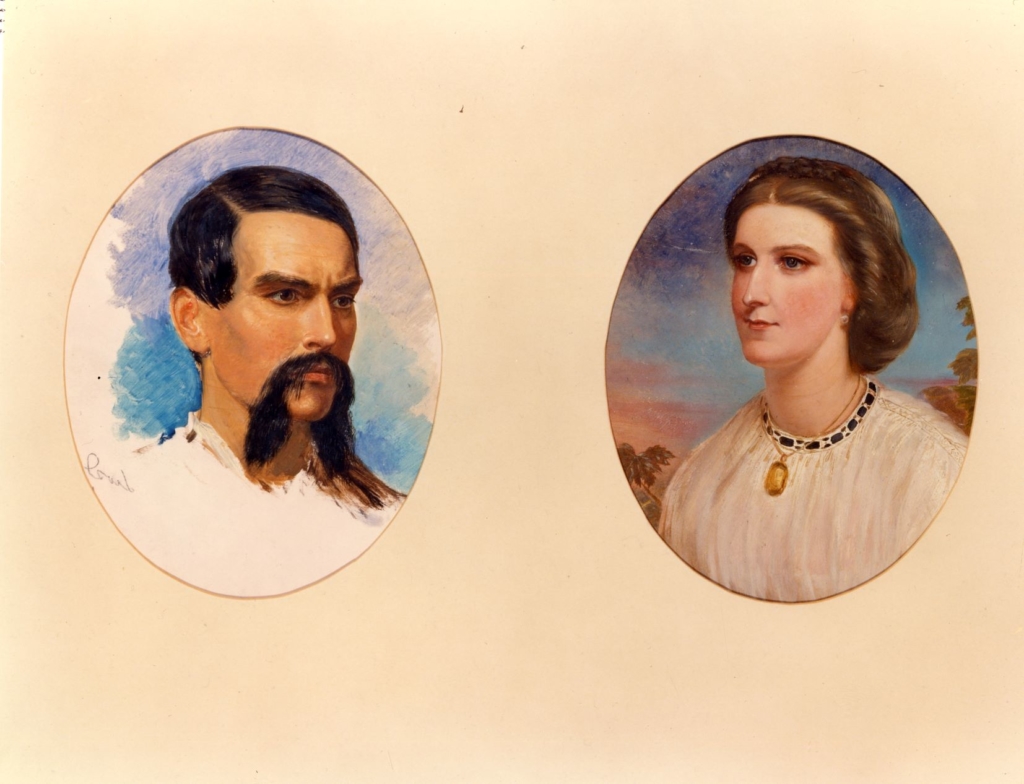
Isabel was not afraid of men and noted a few times in her memoirs moments when she put men of varying social or professional standing in their place. Once, when carrying out Stella Club duties, she came across policemen warning them not to enter garrets, cellars or courtyards in low socioeconomic areas, suggesting that four or five of them could not enter without being attacked. Isabel simply turned to them and said “You go in to catch some rogue, but I go to take the women something; they will not hurt me: but I should be glad if you waited outside in case I do not come out again”. Another fantastic example of her bravery comes from a story she wrote in her autobiography, regarding a local Syrian Muslim, who attempted to force her off her horse with a knife. Instead of running away frightened she jumped down, grabbed him by the throat and with her other hand repeatedly whipped him with her riding crop. The young man was so terrified of this bold, domineering woman that he ran off, though not before one of her servants (who had finally caught up with her) recognised him. She chose not to press charges though did warn the Consul-General of him. This alone would be enough of a story to demonstrate the sort of woman she was, but it doesn’t end there. A year later she found herself in Bludán, Syria administering care to the young man’s eye. She took the opportunity to ask why he had attacked her that day and he explained that he had felt jealous watching her treat the Christian Syrians so well, and just wanted her to notice him. The two became firm friends and she made sure to write to the Consulate to explain that he was no longer a threat.
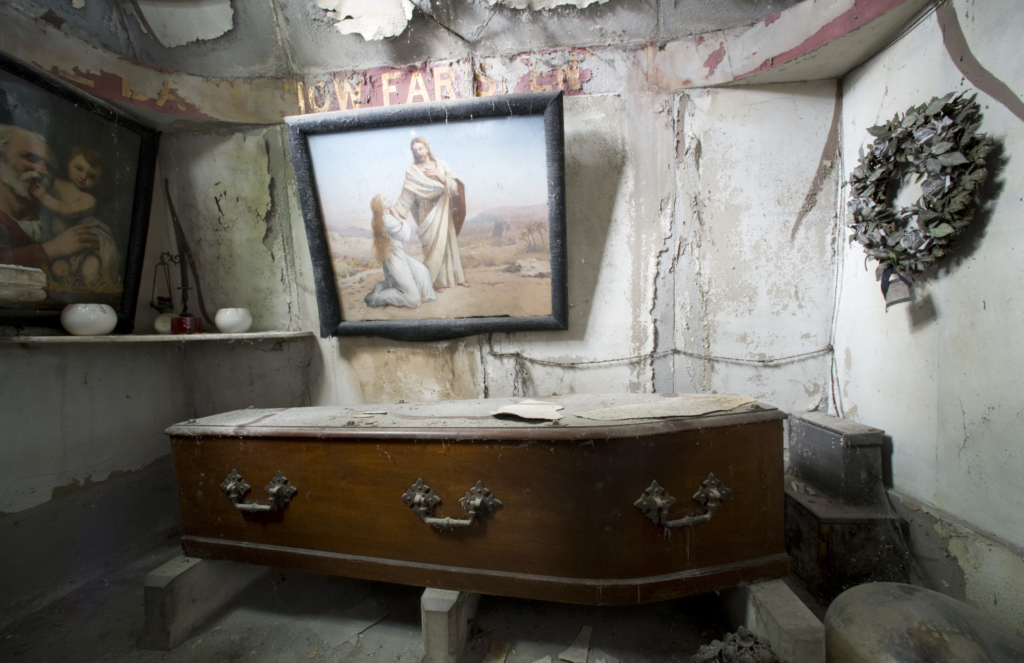
Throughout their marriage and indeed after Richard died in 1890, Isabel made sure to keep her own story and her own talents out of the conversation when it came to his work and his travels. Richard himself often encouraged her to write more and to take ownership for the work that she did for him but she refused. Even when planning her own burial next to Richard in the custom designed Bedouin tent in a Mortlake Cemetery she requested that it simply said “Isabel, his wife” on her plaque. In 1896 after six heartbroken years Lady Isabel joined her ‘destiny’ in his Bedouin tent for one last time and remains by his side to this day. History managed to keep her in the sidelines as simply the wife of a great man, and yet as much as she took great pride in her role of ‘Wife’, she was so much more than that. As she said herself, she truly was ‘The Man of the Day’.